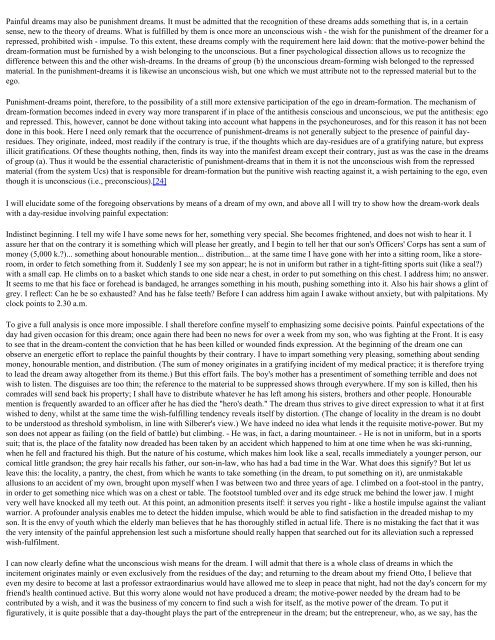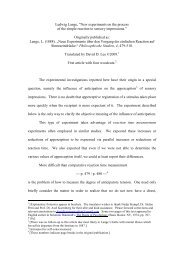The Interpretation Of Dreams Sigmund Freud (1900) PREFACE
The Interpretation Of Dreams Sigmund Freud (1900) PREFACE
The Interpretation Of Dreams Sigmund Freud (1900) PREFACE
Create successful ePaper yourself
Turn your PDF publications into a flip-book with our unique Google optimized e-Paper software.
Painful dreams may also be punishment dreams. It must be admitted that the recognition of these dreams adds something that is, in a certain<br />
sense, new to the theory of dreams. What is fulfilled by them is once more an unconscious wish - the wish for the punishment of the dreamer for a<br />
repressed, prohibited wish - impulse. To this extent, these dreams comply with the requirement here laid down: that the motive-power behind the<br />
dream-formation must be furnished by a wish belonging to the unconscious. But a finer psychological dissection allows us to recognize the<br />
difference between this and the other wish-dreams. In the dreams of group (b) the unconscious dream-forming wish belonged to the repressed<br />
material. In the punishment-dreams it is likewise an unconscious wish, but one which we must attribute not to the repressed material but to the<br />
ego.<br />
Punishment-dreams point, therefore, to the possibility of a still more extensive participation of the ego in dream-formation. <strong>The</strong> mechanism of<br />
dream-formation becomes indeed in every way more transparent if in place of the antithesis conscious and unconscious, we put the antithesis: ego<br />
and repressed. This, however, cannot be done without taking into account what happens in the psychoneuroses, and for this reason it has not been<br />
done in this book. Here I need only remark that the occurrence of punishment-dreams is not generally subject to the presence of painful dayresidues.<br />
<strong>The</strong>y originate, indeed, most readily if the contrary is true, if the thoughts which are day-residues are of a gratifying nature, but express<br />
illicit gratifications. <strong>Of</strong> these thoughts nothing, then, finds its way into the manifest dream except their contrary, just as was the case in the dreams<br />
of group (a). Thus it would be the essential characteristic of punishment-dreams that in them it is not the unconscious wish from the repressed<br />
material (from the system Ucs) that is responsible for dream-formation but the punitive wish reacting against it, a wish pertaining to the ego, even<br />
though it is unconscious (i.e., preconscious).[24]<br />
I will elucidate some of the foregoing observations by means of a dream of my own, and above all I will try to show how the dream-work deals<br />
with a day-residue involving painful expectation:<br />
Indistinct beginning. I tell my wife I have some news for her, something very special. She becomes frightened, and does not wish to hear it. I<br />
assure her that on the contrary it is something which will please her greatly, and I begin to tell her that our son's <strong>Of</strong>ficers' Corps has sent a sum of<br />
money (5,000 k.?)... something about honourable mention... distribution... at the same time I have gone with her into a sitting room, like a storeroom,<br />
in order to fetch something from it. Suddenly I see my son appear; he is not in uniform but rather in a tight-fitting sports suit (like a seal?)<br />
with a small cap. He climbs on to a basket which stands to one side near a chest, in order to put something on this chest. I address him; no answer.<br />
It seems to me that his face or forehead is bandaged, he arranges something in his mouth, pushing something into it. Also his hair shows a glint of<br />
grey. I reflect: Can he be so exhausted? And has he false teeth? Before I can address him again I awake without anxiety, but with palpitations. My<br />
clock points to 2.30 a.m.<br />
To give a full analysis is once more impossible. I shall therefore confine myself to emphasizing some decisive points. Painful expectations of the<br />
day had given occasion for this dream; once again there had been no news for over a week from my son, who was fighting at the Front. It is easy<br />
to see that in the dream-content the conviction that he has been killed or wounded finds expression. At the beginning of the dream one can<br />
observe an energetic effort to replace the painful thoughts by their contrary. I have to impart something very pleasing, something about sending<br />
money, honourable mention, and distribution. (<strong>The</strong> sum of money originates in a gratifying incident of my medical practice; it is therefore trying<br />
to lead the dream away altogether from its theme.) But this effort fails. <strong>The</strong> boy's mother has a presentiment of something terrible and does not<br />
wish to listen. <strong>The</strong> disguises are too thin; the reference to the material to be suppressed shows through everywhere. If my son is killed, then his<br />
comrades will send back his property; I shall have to distribute whatever he has left among his sisters, brothers and other people. Honourable<br />
mention is frequently awarded to an officer after he has died the "hero's death." <strong>The</strong> dream thus strives to give direct expression to what it at first<br />
wished to deny, whilst at the same time the wish-fulfilling tendency reveals itself by distortion. (<strong>The</strong> change of locality in the dream is no doubt<br />
to be understood as threshold symbolism, in line with Silberer's view.) We have indeed no idea what lends it the requisite motive-power. But my<br />
son does not appear as failing (on the field of battle) but climbing. - He was, in fact, a daring mountaineer. - He is not in uniform, but in a sports<br />
suit; that is, the place of the fatality now dreaded has been taken by an accident which happened to him at one time when he was ski-running,<br />
when he fell and fractured his thigh. But the nature of his costume, which makes him look like a seal, recalls immediately a younger person, our<br />
comical little grandson; the grey hair recalls his father, our son-in-law, who has had a bad time in the War. What does this signify? But let us<br />
leave this: the locality, a pantry, the chest, from which he wants to take something (in the dream, to put something on it), are unmistakable<br />
allusions to an accident of my own, brought upon myself when I was between two and three years of age. I climbed on a foot-stool in the pantry,<br />
in order to get something nice which was on a chest or table. <strong>The</strong> footstool tumbled over and its edge struck me behind the lower jaw. I might<br />
very well have knocked all my teeth out. At this point, an admonition presents itself: it serves you right - like a hostile impulse against the valiant<br />
warrior. A profounder analysis enables me to detect the hidden impulse, which would be able to find satisfaction in the dreaded mishap to my<br />
son. It is the envy of youth which the elderly man believes that he has thoroughly stifled in actual life. <strong>The</strong>re is no mistaking the fact that it was<br />
the very intensity of the painful apprehension lest such a misfortune should really happen that searched out for its alleviation such a repressed<br />
wish-fulfilment.<br />
I can now clearly define what the unconscious wish means for the dream. I will admit that there is a whole class of dreams in which the<br />
incitement originates mainly or even exclusively from the residues of the day; and returning to the dream about my friend Otto, I believe that<br />
even my desire to become at last a professor extraordinarius would have allowed me to sleep in peace that night, had not the day's concern for my<br />
friend's health continued active. But this worry alone would not have produced a dream; the motive-power needed by the dream had to be<br />
contributed by a wish, and it was the business of my concern to find such a wish for itself, as the motive power of the dream. To put it<br />
figuratively, it is quite possible that a day-thought plays the part of the entrepreneur in the dream; but the entrepreneur, who, as we say, has the



